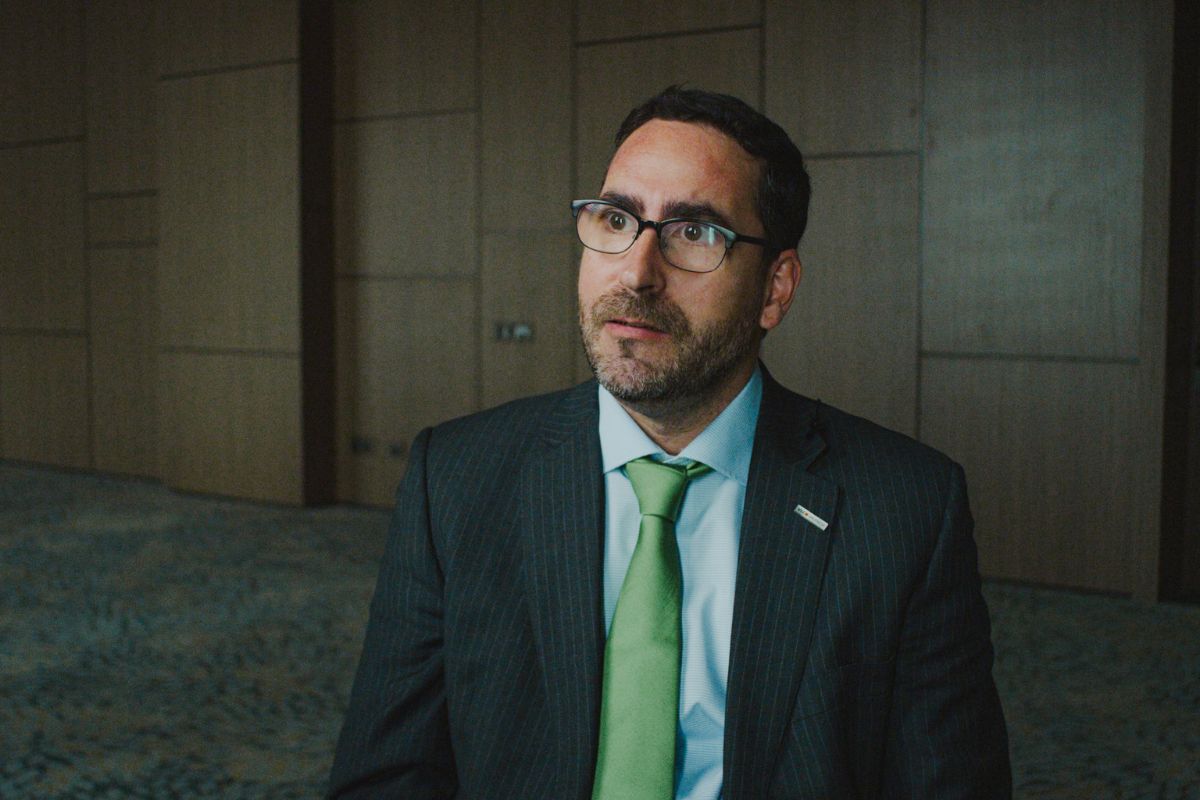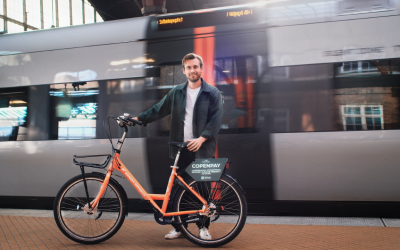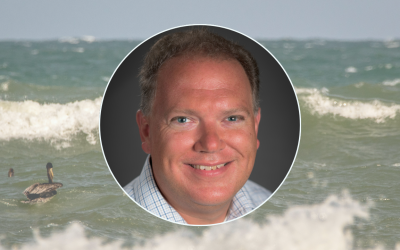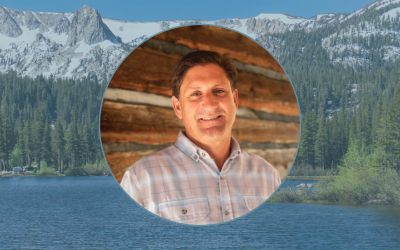“And at the end, this is the best selling proposal that you can have, because the people, they say, well, this is the best city to live in. I want to be there, I want to share it. And this is what we tell the visitors.” – Miguel Angel Perez, Brand & Markets Director at Visit Valencia
It’s been a big couple of years in Valencia. It became the first city to measure and certify its carbon footprint, was recently named a European Capital of Smart Tourism, and followed that up with becoming a World Design Capital. Next year, it becomes the newest Green Capital as selected by The European Commission. A combination of brilliant data gathering, initiatives to improve liveability, and policies supporting sustainability are making a huge positive impact on residents and visitors alike.
Miguel Angel Perez, Brand & Markets Director at Visit Valencia, is one the leaders helping to shape the city’s bright future. In this episode of Travel Beyond, he shares the wins, challenges and landscape that allows Valencia to make such an ambitious change.
You’ll also learn:
- How Valencia’s small steps in sustainability have added up make big impacts.
- What Valencia learned about where the city’s carbon emissions come from.
- How Visit Valencia’s mandate has changed over the past few years.
- Advice on how to get momentum behind ambitious changes.
- What the way of life in Valencia can teach visitors.
Subscribe to Travel Beyond through Apple Podcasts, Spotify, or your favourite podcast player.
Show notes
The European Capital of Smart Tourism is an initiative to reward smart and sustainable tourism practices in European cities.
The European Commission is part of the executive of the European Union, together with the European Council.
Visit Valencia is a non-profit Foundation with the participation of the Valencia City Council (Spain) in association with the majority of the local tourism industry. Its goal is the strategic management and promotion of the city of Valencia as a tourist destination, with a professional focus which combines public and private interest.
Episode transcript
Miguel Angel Perez: These two things are very important. It’s, it’s very difficult to get the balance now between sustainability and profitability. But at the end, what is not profitable, will not be sustainable.
Sara Raymond de Booy: Hello, and welcome to Travel Beyond, where we partner with leading destinations to explore the greatest challenges facing communities and the planet, surfacing their most inspiring solutions. I’m Sara Raymond de Booy, Associate Creative Director at Destination Think.
I’m recording from Seattle, Washington on Coast Salish land, specifically that of the Duwamish, Suquamish, Stillaguamish, and Muckleshoot people. On this podcast, we look at the role of travel and choose to highlight destinations that are global leaders. We talk to changemakers who are addressing regenerative travel through action in their communities, often from the bottom up.
Today, let’s head to Spain’s third-largest city. Nestled up against the Mediterranean on the east coast of Spain, it’s home to over 2,000 years of history that go back at least to Roman times. It’s the birthplace of paella, has countless beaches at its doorstep, and gets taken over every year by a festival so famous that it has UNESCO designation.
But beyond the fireworks, amazing food, and pretty spectacular shorelines, Valencia has a lot going on behind the scenes to ensure that its future remains just as bright. It’s been a big couple of years for Valencia, as it became the first city to measure its carbon footprint, was recently named European Capital of Smart Tourism, and followed that up by becoming a World Design Capital.
Next year it becomes the newest Green Capital as selected by the European Commission. To learn more about the wins, challenges, and landscape that allows for Valencia to make such an impact, Rodney sat down with Miguel Ángel Pérez, Brand and Markets Director at Visit Valencia, to discuss the big and small steps that have come together to make a huge difference.
Rodney Payne: Could you tell me your name and where you work?
Miguel Angel Perez: Miguel Ángel Pérez. I am the Brand and Markets Director at Visit Valencia, which is the DMO for Valencia City in Spain.
Rodney Payne: I’ve heard a lot of terrific things about the work that you’re doing in Valencia and in tourism and pushing into new areas and new ways of thinking.
Can you tell me about your green ambitions as a city?
Miguel Angel Perez: Well, in, in the recent time, we were the first, city to measure the carbon footprint. Measure and certify, now, because there were a lot of people measuring, but one thing is doing your Excel and another thing is certifying all what you’ve done, no?
This has been a success case. And it has been published by the World Tourism Organization, by the British Travel Agencies Association, by many media, no? Since we were doing that, well, first was measuring the needs, really changing the city, not just in tourism, but for all the, locals and the, and the, the citizens, changing the city in a greener way, you know?
So now we have 160 kilometers of bike lanes. We’re making a lot of walkable pedestrian square, reducing a lot the traffic, focusing a lot on, uh, seasonal and, and zero-kilometer gastronomy, and, and so forth.
Last year, we achieved to be the European Smart Tourist Capital in 2022. We were also a World Design Capital. Not just thinking of furniture, lights, and all this design, but on designing better cities for, for citizens to have a better quality of, of life.
And next year, 2024, the European Commission chose Valencia as the Green Capital. And we will be the first Mediterranean city in Europe. There are hundreds of cities. We will be the first one to have this title. And this is recognized by the European Commission to show our green policies, as examples, to other cities.
Rodney Payne: You were the first destination in the world to map your tourism emissions, the first city in the world. That’s not an easy thing to do. What did you find? Where did, where did the emissions come from when you did that project?
Miguel Angel Perez: We found what, uh, everybody’s finding and what they are doing. The main part of the emissions are coming from the, from the transport and, from the transport, the majority from the aviation. In the case of Valencia, we have like, let’s say 50 percent is domestic tourists and 50 percent is international. And from the international, like, 85-90 percent is coming by plane, no? And that’s like 80 percent and the rest, the other 20 percent is transport, food, accommodation, etc.
Rodney Payne: Going forward, what will you do to help to change and reduce?
Miguel Angel Perez: Well, uh, these European titles, Smart Tourist Capital and now Green Capital,
they help also locally to set up these policies and to get also the, the citizens accepting these changes.
There are thousands of people who like, uh, going to buy the bread with their car, yeah? And, uh, maybe the baker is, uh, ten minutes walking, but, like, they like going with their car. And, uh, change these behaviors are not easy. This external recognition, in this case from the European Union, gave us, uh, wings to continue with these changes.
Now, for example, we are buying electric buses. They are more expensive. But we are reducing the carbon footprint by using these electrical buses. Or making all these, uh, pedestrian squares is reducing a lot the traffic in the, in the city center. Now we are making, uh, huge areas in the districts also where you will not be able to use the car, to reduce more the traffic.
When you do these things at the, at the beginning, it’s not easy. Other thing that we are doing is at all our events where, where we cooperate. For example, we did the Michelin awards, one year and a half ago. We will do this year in, in June in two months.
The 50 Best Restaurants awards is the, the most prestigious gastronomy event. In these events, we try to be as sustainable as possible. The next conference from, uh, CityDNA and uh, Global Destination Sustainability, in autumn will be in Valencia. And we use hotel and venues very close so that we can go walking to the places and reduce the transport as much as possible.
Then, we have created guides to offer the MICE, the events organizers, or the film producers that we have also a lot in Valencia recently. They were filming, for example, for Star Wars, for one of the new series. So we were offering them things to use to reduce the plastic from the water, or, or, carton bins to, throw the waste. All these things that are not that difficult are small things, but by making many small things is how you manage to reduce the carbon footprint.
Well, some of them are small, some of them are huge things, like making kilometers and kilometers of bike lanes or making most of the city center at this moment pedestrian in the area, for example, from from the cathedral, from the central market, which is one of the main food courts in, in Europe, and is opposite to our silk exchange market, which is a 500 years building, all these areas, we are making them pedestrian.
At the beginning, for example, many of the shops, they were completely against this these changes. But now, after, after all the renovation has been done, they are seeing that they are getting more visitors. And more locals going to the area, because it’s much nicer working in that area without cars than with cars.
And they have found ways to deliver the products with sustainable ways, with bicycles, with, with electric vehicles offering delivery. And at the end they are also selling more. Their business are more profitable, but at the same time, they are more sustainable. And, uh, these two things are very important.
It’s, it’s very difficult to get the balance now between sustainability and profitability. But at the end, what is not profitable, will not be sustainable.
Rodney Payne: You had to learn to measure your emissions, and built a pretty cool piece of technology to do that, with a partner. And to remove those emissions, you’re also doing some interesting things locally. Can you talk to me about some of the innovation that you’ve had to do to go on the journey?
Miguel Angel Perez: Well, we, we are cooperating with a company which is called, Global Omnium, and this company is the one that manages the water in the city of, of Valencia, and also in other cities and in other, uh, places. And in fact, Valencia is one of the most efficient cities in, Europe and in the world, uh, using the, the water.
They also, uh, manage the aquarium in Valencia, which is one of the main attractions with more visitors in the city. And they are the ones who are behind this strategy for measuring the different, uh, inputs.
Really, I cannot tell you, uh, much more because this is like the Coca Cola recipe, no?
Rodney Payne: It’s top secret.
Miguel Angel Perez: They have been invited in the last, COP meetings, in Glasgow, and we know they are working with several other, uh, cities and countries. Expanding and internationalizing this model from Valencia.
Rodney Payne: What advice do you have for your friends and colleagues in your role around the world at other destinations? You’ve trailblazed and you’ve gone first.
Other people are gonna come behind you. What can they learn from you?
Miguel Angel Perez: You have to be very patient and very also constant and, uh, keep in mind that making changes is not easy, but it’s really worth to do them. Me, myself, I’ve been working 15 years already in Visit Valencia and during around 10 years, my job was getting more and more tourists, more and more, more and more. Quantity was almost the only important thing. And, uh, getting, for example, a lot of aviation and airlines flying to the destination. I was, in fact, starting in long-haul markets, which are the ones that are creating more carbon footprint now.
And now we are changing quite a lot our job. And we are moving a lot of resources, not just financial, but especially also human resources, which sometimes is more difficult, to create value in the destination. Instead of doing that much promotion, that we keep doing a lot of promotion non-stop, but creating a lot of value.
We work with different product clusters in the city, and we are engaging more than 400 companies in the city of Valencia, different clusters, Convention Bureau, gastronomy, sports, shopping, medical destination, film office, et cetera.
Another of my advice is engaging the companies, because we, our DMOs, we cannot do the things alone. Okay, we can do a lot of guides for sustainability and a lot of meetings to talk about these issues. But really they are the ones, the hotels, the restaurants, the catering companies, they are the ones who have to implement these measures.
Of course, the DMO has to lead the way, and we need to believe in what we are doing. In our case, we are extremely happy with the policies that our local government is implementing in the city.
Because this has made possible that Valencia has been leading rankings in the last two years, like the healthiest city in the world or the best city in the world to live. And at the end, this is the best selling proposal that you can have because the people, they say, well, this is the best city to live in. I want to be there. I want to, to share it. And this is what we tell the visitors.
Now, of course, we show the city of arts and sciences and we show our beautiful marina and the nine kilometers park that we have in the river bed and our gastronomy, Valencia’s home of the paella, and Albufera Lake, which is the biggest lake in Spain.
But especially what we show is how we live, how we enjoy life outside, on the streets, having a coffee, trying to live slowly, slow food, slow motion. And what we want is the tourist or the visitors to mix with us and to enjoy the best city in the world to live.
Rodney Payne: I want to thank you for taking a moment to sit down with me and share the story. I’m really glad to have met you. And thank you for blazing a trail for others to follow.
Miguel Angel Perez: Thank you. It was my pleasure.
Sara Raymond de Booy: This has been Travel Beyond, presented by Destination Think. And you just heard from Miguel Angel Perez, Brand and Markets Director at Visit Valencia. We’ll include links to more resources on the blog for this episode at DestinationThink.com.
This episode has been produced and has theme music composed by David Archer. Lindsay Payne and Annika Rautiola provided production support. We would like to thank CityDNA for making this interview possible at their conference in Bulgaria.
We’re always actively looking for the best examples of efforts to regenerate economies, communities, and ecosystems. So be sure to reach out if you have a story to share with us.
You can help more people find the show by subscribing to future episodes and by leaving a rating and review on Apple Podcasts.
See you next time.









0 Comments